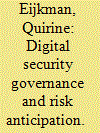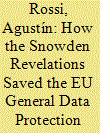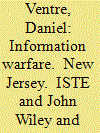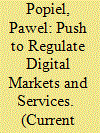|
|
|
Sort Order |
|
|
|
Items / Page
|
|
|
|
|
|
|
| Srl | Item |
| 1 |
ID:
133236


|
|
|
|
|
| Publication |
2014.
|
| Summary/Abstract |
James Margach famously argued that Prime Ministers from Lloyd George to Callaghan had been intent on exploiting the media in their determination to centralise power. From Margaret Thatcher onwards, however, there is a strong argument that the power relationship has been reversed, and that the Leveson Inquiry-set up in the wake of the phone hacking scandal-exposed a political class which had become deeply fearful of the power and influence of the national press. Citing evidence to Leveson and subsequent recommendations by the inquiry, this article presents two case studies-on data protection and on media ownership-where the public interest clearly demanded political intervention, which would be inconvenient for the major publishers. And yet, despite recommendations by Lord Justice Leveson and despite clear support from leading politicians of all parties, there has been virtually no policy progress in either case. While the Leveson Inquiry was billed as a watershed in press-politician relations and an opportunity to counteract decades of unhealthy press power, political inertia in these two areas suggests that very little has changed.
|
|
|
|
|
|
|
|
|
|
|
|
|
|
|
|
| 2 |
ID:
130992


|
|
|
|
|
| Publication |
2014.
|
| Summary/Abstract |
How to Engage with the Politics of Privacy in the Age of Preemptive Security? My suggestion is to start with data protection, which, following De Hert and Gutwirth (2006), is not exactly the same of privacy. Extrapolating from their analysis of the two as different "legal tools," I would say that privacy and data protection are two slightly different rationales of power relations: one of privacy based on the "opacity of the individual" and one of data protection on the "transparency and accountability of the powerful" (Gutwirth and De Hert 2008:275; emphasis in original).1 These rationales (attempt to) orientate two different loose dispositifs, each formed by a composite ensemble of elements. Some of these elements are peculiar to each dispositif, while others are shared or encompassed by both
|
|
|
|
|
|
|
|
|
|
|
|
|
|
|
|
| 3 |
ID:
130993


|
|
|
|
|
| Publication |
2014.
|
| Summary/Abstract |
The anticipatory turn in managing security and safety relies not only on innovative technological tools, but also on social practice. New information and communication technology, for instance, facilitates digital security governance1 which entails the collection, processing, storage, and sharing of digital personal data for risk profiling, but little is known about the role of security officials in preemptive security. Although people, or "data subjects," are categorized according to a (predefined) level of potential threat on the basis of digital data, it is often unclear which actor or agency was responsible for this categorization. This is especially unclear when information was shared across the globe between several security agencies and/or private companies. Nonetheless, as the assessment of risk or dangerousness affects someone's real-life opportunities, privacy rights or claims to something or someone are likely to be evoked.
|
|
|
|
|
|
|
|
|
|
|
|
|
|
|
|
| 4 |
ID:
124104


|
|
|
|
|
| Publication |
2012.
|
| Summary/Abstract |
The article offers comments on the need for a strategy and policy to respond to cyber attack as it is allegedly impossible to block every cyber attack. It is suggested that the industries learn from the vulnerability of the networks attacked while understanding that there is no single defense against a sophisticated and constantly morphing offense. Comments on cyberspace having no boundaries and changing constantly and the need to formulate active defense are also included.
|
|
|
|
|
|
|
|
|
|
|
|
|
|
|
|
| 5 |
ID:
152952


|
|
|
|
|
| Publication |
Burlington, Jones and Barlett Learning, 2014.
|
| Description |
xxiv, 544p.pbk
|
| Series |
Information Systems Security and Assurance Series
|
| Standard Number |
9781284031621
|
|
|
|
|
|
|
|
|
|
|
|
Copies: C:1/I:0,R:0,Q:0
Circulation
| Accession# | Call# | Current Location | Status | Policy | Location |
| 059062 | 005.8/KIM 059062 | Main | On Shelf | General | |
|
|
|
|
| 6 |
ID:
163646


|
|
|
|
|
| Summary/Abstract |
Snowden’s global surveillance revelations inverted the direction of the European Parliament’s debate on the General Data Protection Regulation (GDPR). Before Snowden’s revelations, corporations were shaping Europe’s privacy rules. But when Snowden’s revelations raised the salience of Internet privacy issues, the power of corporations went down, and privacy advocates incorporated their preferences into the GDPR. Thus, the fact that Snowden was able to increase the salience of privacy issues was instrumental in defeating organised corporate power and enabling privacy advocates to mobilise Europe’s culture of privacy protection.
|
|
|
|
|
|
|
|
|
|
|
|
|
|
|
|
| 7 |
ID:
096171


|
|
|
|
|
| Publication |
New Jersey, ISTE and John Wiley and Sons, 2009.
|
| Description |
xix, 303p.
|
| Standard Number |
9781848210943
|
|
|
|
|
|
|
|
|
|
|
|
Copies: C:1/I:0,R:0,Q:0
Circulation
| Accession# | Call# | Current Location | Status | Policy | Location |
| 054937 | 355.343/VEN 054937 | Main | On Shelf | General | |
|
|
|
|
| 8 |
ID:
180565


|
|
|
|
|
| Summary/Abstract |
The article examines the role of NGOs in the politicisation of EU security. The focus of the empirical analysis lies on the field of EU counter-terrorism. The cases selected are two different types of legal acts, adopted in the aftermath of serious terrorist attacks in EU member states: The EU data retention directive and the EU passenger name record (PNR) directive. These policies present intrusiveness and relevance for Brussels-based and national civil rights NGOs since they both aim to touch upon individual liberties, like privacy rights or the right to protect personal data. The article goes further by opening up the black box of politicisation. It does so by assuming that politicisation is characterised by a certain level of salience, actor range and polarisation. The paper links politicisation literature to research on the influence of interest groups that are discussing, for example, voice, access or litigation as strategies. Therewith, the paper contributes to the scientific debate on politicisation in two ways: First, it sheds light on the so far disregarded role of NGOs in politicisation. Second, it builds a bridge to interest group literature by examining repertoires of NGOs in politicisation.485-503
|
|
|
|
|
|
|
|
|
|
|
|
|
|
|
|
| 9 |
ID:
189696


|
|
|
|
|
| Summary/Abstract |
In the past few years, efforts to regulate digital platform services have grown in analytical sophistication, acquired political momentum, and started to produce legislative and regulatory interventions. The emerging policy frameworks—which tend to focus on content, data, and market power concerns—show degrees of variation, by region and by policy domain, and reflect various normative and policy goals. This essay examines their underlying policy goals, normative commitments, and the tensions and trade-offs they present.
|
|
|
|
|
|
|
|
|
|
|
|
|
|
|
|
| 10 |
ID:
053644


|
|
|
|
|
| Edition |
2nd ed.
|
| Publication |
Upper Saddle River, Prentice Hall, 1997.
|
| Description |
xii, 574p.
|
| Standard Number |
0133374866
|
|
|
|
|
|
|
|
|
|
|
|
Copies: C:1/I:0,R:0,Q:0
Circulation
| Accession# | Call# | Current Location | Status | Policy | Location |
| 045685 | 005.8/PFL 045685 | Main | On Shelf | General | |
|
|
|
|
| 11 |
ID:
111386


|
|
|
|
|
| Publication |
2012.
|
| Summary/Abstract |
Smart meters are being rolled out in large numbers throughout the world, with proponents claiming they are a critical step in the transition to a low-carbon economy. Yet there are significant unresolved negative reactions to smart meters, principally based on the concern that smart meters might be used to infer the private activities that occur within a dwelling. Though smart meter data is classified as personal data, and as such protected under existing data protection frameworks in the EU, there are relevant exceptions, notably where the data is required for legitimate applications associated with the performance of 'regulated duties'. This paper contributes to this debate by examining the data requirements for some of the proposed applications of smart meter data within the electricity supply industry, and investigates whether the use of personal data can be minimized or even avoided. The discussion includes system balancing, demand reduction, demand response and distribution network operation and planning, and indicates that, for most of these applications, the requirements for personal data can indeed be minimized. 'Privacy friendly' alternatives are discussed.
|
|
|
|
|
|
|
|
|
|
|
|
|
|
|
|
| 12 |
ID:
172219


|
|
|
|
|
| Summary/Abstract |
The impact of artificial intelligence (AI) on every aspect of our lives is inevitable and already being felt in numerous ways. Countries are grappling with the opportunities and challenges that AI presents. Among the South Asian countries, India has taken a lead in promoting and regulating AI. However, it lags significantly behind countries such as China or the United States. This article explores India’s AI ecosystem, the threats and challenges it faces, and the ethical issues it needs to consider. Finally, it examines the common concerns among South Asian nations and the possibility of coming together to promote and regulate AI in the region.
|
|
|
|
|
|
|
|
|
|
|
|
|
|
|
|
|
|
|
|
|